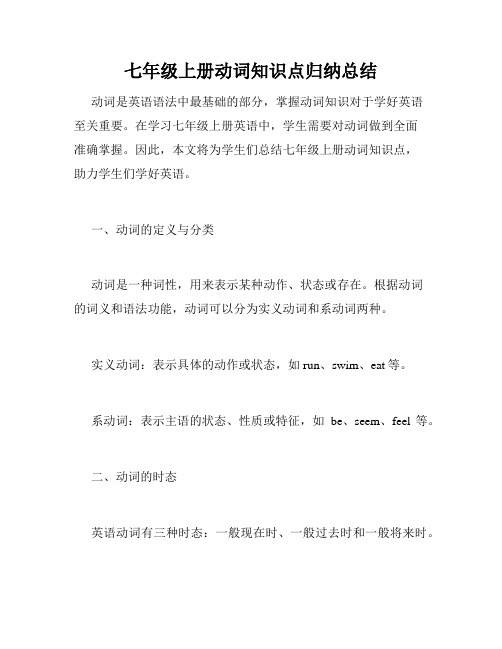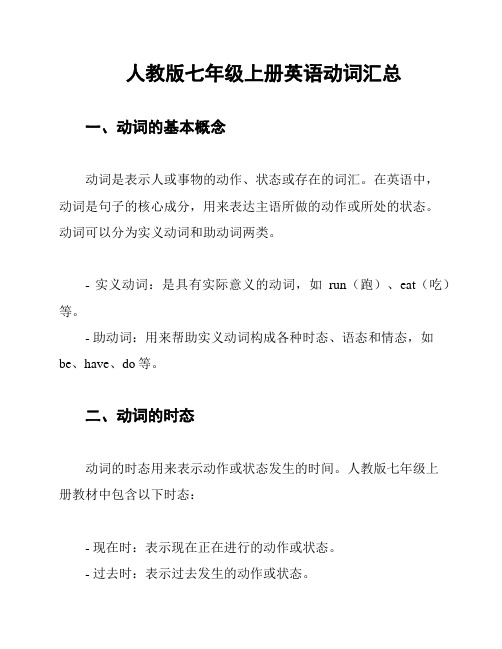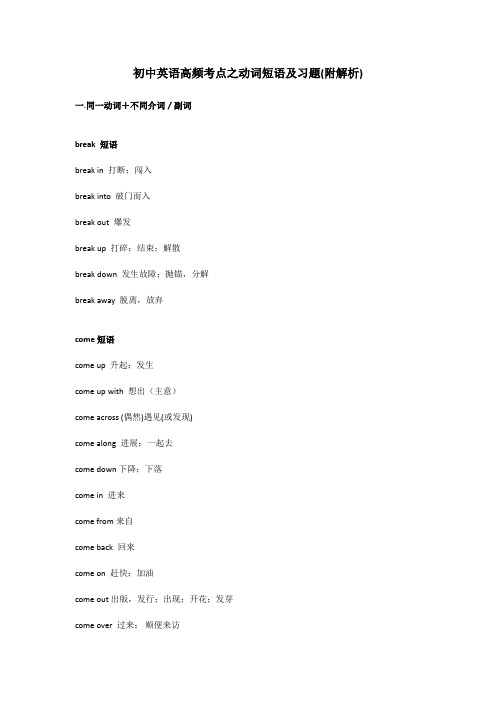(完整)七年级上册英语动词分类及用法+练习((2)
(完整版)人教版七年级上册英语全册语法知识点梳理,推荐文档

第一讲:动词一.Be 动词(am, is, are)的用法口诀:I 用 am , you 用 are ,is 连着他(he)她(she)它(it)。
单数全部用 is,复数一律都用 are. 变疑问,往前提,句末问号莫丢弃,变否定,更容易,be 后 not 莫忘记,句首大写莫迟疑。
I a student. You Japanese.He my brother. She very nice.My name Harry. LiLei very tall.This book very interesting. Li Lei and I good friends.These apples. Those bananas.They students. There some bread on the plate.The cat black. The black pants for Su Yang.Here some sweaters for you. There a girl in the room.There some milk for me. There some apples on the tree.Gao Shan's shirt over there. Some tea in the glass.二.一般现在时态1.用法:(1).表示习惯性,经常性的动作,常与o f t e n,a l w a y s,u s u a ll y,e v e r y d a y/w ee k/m o n t h…等词连用I o f t e n p l a y s o cc e r.(2).表示主语具备的性格或能力:H e li k e s t o e a t b a n a n a s.2.在一般现在时态中,当主语是第三人称单数时,谓语动词也用第三人称单数, 第三人称单数的构成规则(主语不是第三人称单数时谓语动词用原形):a.一般情况下在动词词尾加 s 如:get----gets like----likes play—plays, want—wants,work—works,b.以字母 s、x、ch, sh,o 结尾的动词加-es:guess—guesses, fix—fixes, teach—teaches,brush—brushes, go—goes,c.以辅音字母+y 结尾的动词,先变y 为i,再加-es:study—studies,carry—carries,fly—flies,特殊词: have --- has一写出下列动词的三单形式。
七年级上册动词知识点归纳总结

七年级上册动词知识点归纳总结动词是英语语法中最基础的部分,掌握动词知识对于学好英语至关重要。
在学习七年级上册英语中,学生需要对动词做到全面准确掌握。
因此,本文将为学生们总结七年级上册动词知识点,助力学生们学好英语。
一、动词的定义与分类动词是一种词性,用来表示某种动作、状态或存在。
根据动词的词义和语法功能,动词可以分为实义动词和系动词两种。
实义动词:表示具体的动作或状态,如run、swim、eat等。
系动词:表示主语的状态、性质或特征,如be、seem、feel等。
二、动词的时态英语动词有三种时态:一般现在时、一般过去时和一般将来时。
一般现在时:表示现在正在进行或经常进行的动作或状态。
一般过去时:表示过去发生的动作或状态。
一般将来时:表示将来发生的动作或状态。
三、动词的语态英语动词有两种语态:主动语态和被动语态。
主动语态:表示主语是动作的执行者,如I read books.被动语态:表示主语是动作的承受者,如Books are read by me.四、动词的情态情态动词是一种特殊的动词形式,用于表示说话者对动作发生的看法或态度。
英语中常用的情态动词有can、could、may、might、must、should等。
五、动词的不定式动词的不定式是一种特殊的动词形式,被用于表示动作或状态的目的、结果、方向等。
英语中的不定式由to+动词原形构成。
六、动词的-ing形式动词的-ing形式可以作为动名词或现在分词使用。
动名词:表示某种状态或动作的行为,如Swimming is good for your health.现在分词:表示正在进行的动作,如She is swimming in the pool.七、动词的过去分词动词的过去分词通常用于构成完成时态和被动语态,并且在被动语态中与助动词be搭配使用。
完成时态:I have eaten breakfast.被动语态:The book has been read by him.八、动词的关系动词之间常常存在一些关系,包括并列关系、主从关系、时间顺序关系等。
七年级上册英语动词用法归纳

七年级上册英语动词用法归纳
以下是七年级上册英语动词用法的一些归纳:
1. be动词(am, is, are):表示存在或状态,不能单独作谓语,需要与表
语一起使用,表示“是”。
2. 实意动词:表示具体的动作或行为,可以单独作谓语。
在英语中,大多数动词都是实意动词。
3. 助动词:没有实际意义,只是帮助构成时态、语态、疑问句等。
常见的助动词有do, does, did等。
4. 情态动词:表示说话人的语气和态度,不能单独作谓语,需要与实意动词一起使用。
常见的情态动词有can, may, must等。
5. 动词不定式:表示未确定或未来的动作,可以在句子中作主语、宾语、定语等。
不定式有to+动词原形,有时可以省略to。
6. 动词现在分词:表示正在进行的动作或状态,可以在句子中作定语、状语、宾语补足语等。
分词有-ing形式。
7. 动词过去分词:表示已经完成的动作或状态,可以在句子中作定语、表语、宾语补足语等。
分词有-ed形式。
希望这些归纳对您有所帮助!如果您还有其他问题或需要更详细的解释,请随时提问。
人教版七年级上册英语动词汇总

人教版七年级上册英语动词汇总
一、动词的基本概念
动词是表示人或事物的动作、状态或存在的词汇。
在英语中,
动词是句子的核心成分,用来表达主语所做的动作或所处的状态。
动词可以分为实义动词和助动词两类。
- 实义动词:是具有实际意义的动词,如run(跑)、eat(吃)等。
- 助动词:用来帮助实义动词构成各种时态、语态和情态,如be、have、do等。
二、动词的时态
动词的时态用来表示动作或状态发生的时间。
人教版七年级上
册教材中包含以下时态:
- 现在时:表示现在正在进行的动作或状态。
- 过去时:表示过去发生的动作或状态。
- 将来时:表示将来要发生的动作或状态。
三、常用动词
下面是人教版七年级上册教材中常用的动词列表:
1. be(是、存在)
2. have(有)
3. do(做)
4. go(去)
5. study(研究)
6. play(玩)
7. like(喜欢)
8. want(想要)
9. eat(吃)
10. drink(喝)
11. sleep(睡觉)
12. watch(观看)
13. read(阅读)
14. write(写)
15. listen(听)
16. speak(说)
以上是人教版七年级上册英语动词的概况及常用动词列表,希
望能对你的研究有所帮助。
注:本文档内容为根据人教版七年级上册教材整理的动词汇总,仅供参考使用。
如有引用,请务必确认并注明出处。
北师大版七年级上册英语 Unit 2 词汇和语法基础(解析版) (2)

知识图谱Unit 2 School Life知识精讲一、必背词汇life n. 生活;一生;生命map n. 地图use n. 使用;应用;利用notebook n. 笔记本ready adj. 准备好的heavy adj. 重的take v. 携带;带去;取出out prep., adv. (从……里)出来clothes n. 衣服CD光盘direction n. 方向,方位help v. 帮助n. 帮助,帮忙ask v. 问,询问;要求;请求borrow v. 借;借入;借用carry v. 拿;搬;带;抱check v. 检查,核查find v. 找到;发现;感到sure adj. 确信的,肯定的adv. 确信,一定then adv. 然后;当时,那时upstairs adv. 在楼上,;到楼上lend v. 借出,借给classmate n. 同班同学homework n. 家庭作业quarter n. 一刻钟;四分之一past prep. 在……之后Monday n. 星期一Tuesday n. 星期二Wednesday n. 星期三Thursday n. 星期四Friday n. 星期五Saturday n. 星期六Sunday n. 星期日when adv. 什么时候;何时next adj. 接下来的;下一个的lesson n. 课,一节课first adv. 第一;最初sorry adj. 对不起的,抱歉;难过的wait v. 等,等候start v., n. 开始club n. 俱乐部;社团July n. 七月chess n. 国际象棋practice n. 练习funny adj. 好笑的,滑稽的二、重点词汇1. life noun /laɪf/1). the period between birth and death, or the experience or state of being alive寿命;生命;一生,人生;生活;性命例句:Life’s too short to worry about money!人生短暂,何必为金钱而烦恼!He doesn’t know what he really wants in life.他不知道自己在生活中真正想要的是什么。
(word完整版)人教版英语七年级上册所有单元知识点总结(2),推荐文档

七年级各单元知识点汇总Unitl My name 'Gina.重点短语1. your/his/her/my name 你的/他的/她的/我的名词2. first name 名字3. middle school 中学4. teleph one nu mber 电话号码5. last name 姓6. in Chi na 在中国重点句型1. —What 'your name?你叫什么名字?—Alan艾伦2. —I'm Jenny. Nice to meet you.我是珍妮。
见到你很高兴。
—Nice to meet you, too.见到你我也很高兴。
3. —Good morni ng! I 'm Ci ndy.早上好!我是辛迪。
—Hello, Ci ndy! I'm Dale .你好,辛迪!我是戴尔。
4. —My name 'Linda. Are you Helen?我是琳达。
你是海伦吗?5. —What 'her name?她叫什么名字?—She'Ja ne.她是简。
6. —Is he Jack?他是杰克吗?—No, he isn ' t. His namMke'.不,他不是。
他的名字是迈克。
7. What 'your phone number?你的电话号码是多少?It'587-6275.它是587-6275。
8. My friend is in China.我的朋友在中国。
重点语法2. Be动词的一般现在时形式:am, is, areI 用am You 用areIs用于他他它Unit2 This is my sister.重点短语1. family n ame 全家福2. have a good day (表示祝愿)过得愉快!3. a picture of 一张.... 的照片4. in the first phone 在第一张照片里5. family tree家庭关系图6. the name of ................... 的名字重点句型1. That 'my family. Those are my pare nts.那是我的家人,那是我的妹妹。
人教版七年级上册英语动词分类及用法+练习(无答案)

七年级英语动词分类及用法动词(v.): 一般情况下,按照作用和用途,英语动词可分为三类:be动词、情态动词,行为动词、助动词。
be动词表示状态, 情态动词表示说话人的情绪态度或看法,行为动词表示动作,助动词没有实际词意,只起语法作用。
一、be动词:英语中be动词也叫系动词,基本形式有am, is, are 三种。
其用法如下:我(I)用am,你(you)用are,is用于他(he),她(she),它(it);单数名词用is,复数名词全用are.变疑问,往前提,句末问号莫丢弃。
变否定,更容易, be后not莫忘记。
疑问否定任你变,句首大写莫迟疑。
be动词练习1. I ________ from Australia.2. She _______ a student.3. Jane and Tom _________ my friends.4. My parents _______ very busy every day.5. Where _________ you from?6._________ they your new friends?7. The girl______ Jack's sister.8. The dog _______ tall and fat.9. Jack’s friend ______ in Class One.10. Where _____ your mother? She ______ at home.11. Whose dress ______ this?12. That ______ my red skirt.14. These _____ buses.15. Some tea ______ in the glass.16. Gao Shan's shirt _______ over there.17. ______ David and Helen from England?18. We ____ friends.19. The two cups of milk _____ for me.20. The man with big eyes _______ a teacher.二、助动词:本身无实意,只有实意动词作谓语时才涉及使用,起到辅助作用。
(完整)最新初中英语常见动词短语汇总及练习题(附解析)(2),推荐文档

初中英语高频考点之动词短语及习题(附解析)一.同一动词+不同介词/副词break 短语break in 打断;闯入break into 破门而入break out 爆发break up 打碎;结束;解散break down 发生故障;抛锚,分解break away 脱离,放弃come短语come up 升起;发生come up with 想出(主意)come across (偶然)遇见(或发现)come along 进展;一起去come down下降;下落come in 进来come from来自come back 回来come on 赶快;加油come out出版,发行;出现;开花;发芽come over 过来;顺便来访come true(希望、梦想等)实现,成为现实cut 短语cut up 切碎cut down 砍到,消减cut off 切断,切除cut out 删除;删去;剪下cut in 插嘴fall短语fall into 落入;陷入fall behind 落后fall down 摔倒,倒塌fall off (从……上)掉下fall asleep 入睡fall over 绊倒;跌倒get短语get away 逃离get back返回get down 下降get on上车get off下车get over 克服get up起床;起来get along/on with sb. 与某人相处go短语go away走开;离开go back回去go up上升;增长go out出去;熄灭go off(闹钟)发出响声go over仔细检查;复习go through通过give短语give away赠送;分发give back还给;归还;恢复(健康等)give in投降,屈服give out发出(气味、光线、声音、信号);分发give up放弃jump短语jump into 跳入jump over 跳过jump off 跳离leave短语leave for 出发前往;动身去leave behind 留下;遗留leave out 遗漏;省去;不考虑leave alone 不打扰;不理look短语look after 照顾;照看look at看look around 环顾四周look for寻找;寻求look into 调查look out当心look over (仔细)检查look through浏览look up(在词典、参考书等中)查阅;查找look up to钦佩;仰慕;尊敬look down upon瞧不起look forward to 盼望;期待put短语put away把……收起来;储存……备用put down写下;放下put off推迟;拖延put on穿上;上演;增加put out扑灭;熄灭(火);伸出put up 张贴;搭建put back 放回原处;把(钟)拨慢take短语take away拿走;带走take down取下;记下;拆卸take in吸入;吞入(体内)take out取出take off 脱下(衣服);(飞机等)起飞take up占据(时间、空间);开始从事;拿起take care当心;小心take after (在外貌、性格等方面)与(父母等)相像take care of照看;照顾turn短语turn down调低;拒绝turn up调高;出现turn on打开;接通turn off 关闭;切断turn out结果是turn in上交send out 发出,发送,派遣send up 发射send for 派人去请send in 寄去,递交二.不同动词+同一介词/副词about短语care about 关心;在意hear about (=hear of )听说talk about谈论;讨论;think about考虑;认为throw about 乱丢;抛撒worry about担心at短语point at 指向look at 看(某人)throw at 投向;掷向laugh at (sb.)嘲笑(某人)knock at 敲shout at(sb.)对(某人)大喊aim at 瞄准;旨在get away逃离give away 赠送;分发put away把……收起来;储存……备用run away逃跑;跑掉take away 拿走throw away扔掉move away 搬走,移开back短语bring back 恢复;使想起;归还come back回来get back回来;恢复give back归还;送回go back 回去talk back 回嘴;顶嘴pay back 偿还(借款等)down短语break down 停止运转;出故障calm down 保持冷静cut down砍倒;削减fall down 落下;摔倒get down 下来;落下put down 写下;记下;放下shut down 关上;停业shoot down 射下,击落take down 拆除;记录turn down调低;关小;拒绝write down写下;记下in短语believe in信任;信赖bring in 引进;生产check in 报到;登记come in进来hand in交上;提交;呈送take in吸入;吞入(体内);理解;欺骗join in 参加,加入of短语hear of 听说think of 想起;认为;考虑get out of 离开;从……出来take care of照顾;照看off短语break off突然中止;中断cut off切除;切断drop off 减少;下降fall off从……掉下get off脱下;下车go off (闹钟)发出响声;发出(光、热等)keep off勿踏;勿踩knock off 停止做某事pay off偿清(欠款等)put off推迟;拖延run off 跑掉;迅速离开see off(为某人)送行set off动身(去某地);起程send off 派遣shut off关闭;停止运转take off 脱下(衣服),(飞机等)起飞tell off 责备;分派turn off 关闭on短语put on 穿上turn on打开fight on坚持pass on 传递keep on继续(进行)try on试穿;试试看work on从事;忙于depend on依赖come on赶快;加油;来吧hold on等一等(别挂电话)out短语blow out 吹灭break out(战争、火灾等)突然发生;爆发bring out 使显现;使表现出check out查看;观察clean out清除;把……打扫干净clear out 清理;丢掉come out出版;发表cut out 删除;删去find out查明;弄清get out 出去,离开give out发出(气味、光线、声音、信号);分发go out 出去;熄灭hand out分发;发放hang out 闲逛keep out不让......进入leave out 不包括;不提及;忽略look out留神;当心put out扑灭;熄灭(火)point out 指出run out 用尽;耗尽sell out卖完;售光set out 出发;启程stand out 站出来;突出;坚持到底take out取出work out算出;解决help (sb.) out帮助(某人)解决困难over短语come over 过来;顺便来访fall over 绊倒;跌倒get over 克服;恢复;原谅go over 仔细检查;复习look over(仔细)检查think over 仔细考虑up短语bring up教育;培养;提出cheer up使振奋;使高兴起来(cheer sb. up) clean up(把……)打扫干净;(把……)收拾整齐cut up切碎dress up穿上盛装;装扮eat up 吃光;吃完fix up修理;修补get up 起床give up放弃grow up成长;长大hang up挂断电话hurry up赶快look up(在词典、参考书等中)查阅;查找make up 编造;形成;组成pick up捡起;接电话put up张贴;搭建ring up 打电话send up 发射,把……送上去set up建立;创立;开办show up出席;露面stay up不睡觉;熬夜take up (尤指为消遣)学着做;开始做think up想出turn up开大(声音);出现use up用完;用光;耗尽wake up 醒来with短语agree with赞同;持相同意见begin with以……开始connect with与……相连deal with处理;应付catch up with 赶上come up with提出;想出(主意、回答等) get along/on with sb.与某人相处go on with继续keep in touch with sb.与某人保持联系keep up with与......并驾齐驱;跟上习题及解析1.We will never _______ our dream until it comes true one day.A.give upB. give inC. give outD. give awayA【解析】句意:我们永远不会_____ 我们的梦想直到它实现的那一天。
- 1、下载文档前请自行甄别文档内容的完整性,平台不提供额外的编辑、内容补充、找答案等附加服务。
- 2、"仅部分预览"的文档,不可在线预览部分如存在完整性等问题,可反馈申请退款(可完整预览的文档不适用该条件!)。
- 3、如文档侵犯您的权益,请联系客服反馈,我们会尽快为您处理(人工客服工作时间:9:00-18:30)。
七年级英语专项练习动词动词(v.): 一般情况下,按照作用和用途,英语动词可分为三类:be动词、情态动词,行为动词、助动词。
be动词表示状态, 情态动词表示说话人的情绪态度或看法,行为动词表示动作,助动词没有实际词意,只起语法作用。
be动词:英语中be动词练习1. I ________ from Australia.2. She _______ a student.3. Jane and Tom _________ my friends.4. My parents _______ very busy every day.5. Where _________ you from?6._________ they your new friends?7. The girl______ Jack's sister.8. The dog _______ tall and fat.9. Jack’s friend ______ in Class One.10. Where _____ your mother? She ______ at home.11. Whose dress ______ this?12. That ______ my red skirt.14. These _____ buses.15. Some tea ______ in the glass.16. Gao Shan's shirt _______ over there.17. ______ David and Helen from England?18. We ____ friends.19. The two cups of milk _____ for me.20. The man with big eyes _______ a teacher. 助动词:本身无实意,只有实意动词作谓语时才涉及使用,起到辅助作用。
常见的有do/does/did,后+V原。
如:I like it.-------- Do you like it?Michael likes Chinese Food.----Does Michael like Chinese food? Yes, he does./ No, he doesn't.Jane and Helen like music.----Do Jand and Helen like music? Yes, they do./ No, they don't.助动词练习1:She ________ to see documentaries(记录片).A、do wantB、don't wantC、doesn't wantD、not want2:Look at that picture on the wall. __________ you like it?A、DoB、CanC、CouldD、Are3:He ________ like pears.A、doB、isC、doesn'tD、not4:—Do you often go to the cinema______ Sunday? —No, we__________.A、on, don'tB、on, aren'tC、in, doD、in, don't5:Li Lei ______ lunch at home.A、hasn’tB、haven’tC、don’t haveD、doesn’t have6:—Does the boy want to be an actor? —________.A、Yes, he isB、No, he doesC、Yes, he doesD、No, he isn't7:_________ he have any apples ?A、DoB、DoesC、IsD、Are8:She ______ want to be a policewoman, because she thinks it’s kind of dangerous.A、isn’tB、aren’tC、don’tD、doesn’t9:Why____he have brown hair?A、doB、doesC、isD、has10:What time__________ he get home every day?A、isB、doesC、doD、am11:Jack_______ like flying kites______ throwing a frisby.A、don't, orB、doesn't, andC、don't, andD、doesn't, or12:A:________ Jim ________ a ball? B:No, he________.A、Do, have, don'tB、Does, has, doesn'tC、Is, have, isn'tD、Does, have, doesn't13:I ________ have a watch.A、am notB、doesC、don'tD、doesn't14:____you____a good time on your vacation?A、Did; haveB、Did; hadC、Were; haveD、Were; had15:Simon likes _____ football, but he doesn’t _____ it well.A、play, playsB、to play, playsC、plays, playingD、playing, play16:She____have to wash the dishes now.A、don'tB、notC、doesn'tD、can't17:—________Colin ________ Chinese history? —Yes, he does.A、Do; likeB、Does; likesC、Do; likesD、Does; like实意动词:即行为动词,表示动作的动词。
它有时态及人称和数的变化。
变否定句在实意动词前加助动词don’t或doesn’t,变疑问句在句首加do 或does。
常见的实意动词有:go, come, walk, ride, drive, watch, begin, listen, swim, play, talk, make, clean, dance, sing, borrow, use, keep, return, sit, write, draw, learn, study, put, look, sleep, move, miss, stop, hurt, lose, cross, turn, speed, enjoy, fall, forget, bring, wash, wish, blow, start, climb, rain, snow, remember, travel, hope, prepare, decide, arrive, stay, knock实意动词分及物动词(后跟有宾语)和不及物动词(不跟宾语)。
及物动词多,不及物动词少,常见的不及物动词有look (at), listen(to), live(in), wait (for) ,arrive (in\at)等等。
实意动词练习1. He ____________ (live) in Beijing for several days every year.2. Ms. Lin _____________ (teach) English in our school3. He always________ (have)dinner at home.4. She and I ________ (watch) TV in the evening.5. Mike______ (like) cooking.6. He _________ (read) English every day.7. My brother _________ (make) a model plane.8. Let’s ________ (go) and play soccer.9. I _____ (not) like music.10. We _________ (go) to school at seven in the morning.11. Liu Tao _________ (do) not like PE.12. I can ________ (draw) many beautiful pictures情态动词:情态动词是一种本身有一定的词义,表示说话人的情绪、态度或语气的动词,但不能单独作谓语,只能+动词原形,构成复合谓语,没有人称和数的变化。
如:I can speak Chinese. 2. He can sing English songs.常见的情态动词:can (could), may (might), shall (should), will (would) .must, had better, have to等等,否定直接在后面加not如:We can be there on time tomorrow.我们明天能按时去那儿。
May I have your name? 我能知道你的名字吗?情态动词练习1. The children___ play football on the road.A. can'tB. canC. mustn'tD. must2. ----Can you speak Japanese? ----No, I____.A. mustn'tB. can'tC. needn'tD. may not3.-Can you see a light on the table?-Yes, ________.A、I amB、I’m notC、I canD、He isn’t4. _________ I come in ?5. I _________ speak a little French.6. The red light(灯) is on. We __________ stop.7. I _________ drive a car.8. He is a dancer. He can ____________ (dance) very well.9. Would you please _______________ (help) me10. The boy shouldn’t ________________(draw) on the wall.非谓语动词V+ing 形式喜欢做某事like/love/enjoy doing sth开始做某事begin/start doing sth停止做某事stop doing sth去做某事go running swimming /shopping建议做某事What/how about doing sth?标志语言No smoking./chatting / eating .做完某事finish doing sth练习作某事practice doing sth作为句子主语:Cooking is for moms .I think talking to him is a waste of time .表示允许或请求: Do you mind turning down the TV ?He doesn’t mind doing it again .介词后做宾语:Thanks a lot for joining us .What about going to a movie ?After talking to his teacher , the boy felt relaxed .Before leaving , remember to close the door .Mary is very interested in going shopping .Sam is good at writing stories .做某事很愉快have fun / enjoy oneself / have a good time doing sth 花费多少时间去做某事sb spend some time (in) doing sth讨厌做某事dislike doing sthto+V 形式想做某事want / would like to do sth要求别人去做某事:ask / tell / would like / want sb to do sth忘记/ 记得要做某事:forget / remember to do sth希望做某事:hope to do sth决定做某事decide to do sth需要做某事need to do sth停下来做某事stop to do sth尽力去做某事try / try one’s best to do sth到了做某事的年龄be old enough to do sth到了做某事的时间It’s time (for sb ) to do sth花多少时间去做某事It takes sb some time to do sth准备做某事get ready to do sth某人做某事怎么样?sb is / was happy / surprised / excited to do sth 对某人来说做某事怎么样?It’s + adj. + for sb + to do sth 学会做某事learn to do sth喜欢做某事like / love to do sth帮助某人做某事help sb (to) do sthV原形让/使某人去做某事let / make sb do sth建议为何不做某事Why not + do sth祈使句Sit down .Please don’t walk on the grass情态动词后can / may / must / have (has) to + do sth1.Bob likes _____________(go) to the movies with his friends and playing sports.2. Bridge Street is a good place _______________(have) fun.3. Let me ____________(tell) you the way to my house.4. We want a P.E. teacher _______________(teach) soccer and volleyball.5. Does she want ______________(go) to the movies?6. Thank you for _____________(join) us?7. Look at the people _______________(play) beach volleyball.8. I hope ______________(do) the following things in order to ___________(improve) my English.9. She loves _________ (tell) jokes and never stops _________(talk).10. Can you go _____________(shop) with me?11. Many boys enjoy ___________(play) soccer.12. Yesterday I watched the boys _____________(play) tennis.13. The children had great fun ________________(play) in the water.14. On my way home I found a boy ____________(cry) in the corner.15. Can you help me ____________(clean) my room?16. He made me ____________(wait) for a long time.17. What about ____________(eat) something?18. We have to _____________(get ) to school by seven.19. There are someone ______________(sing) in the next room.20. Would you like ____________(have ) a rest?21. I often do some ____________(read) on rainy days.22. It is time ___________(go) home. Stop _____________(write),please.23. He went to Beijing _______________(see) his uncle last summer.。
